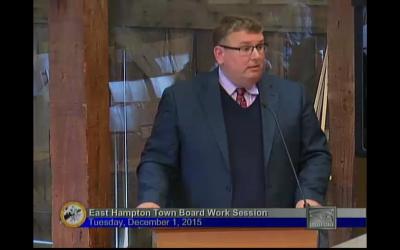Rental Registry Appears Certain

The East Hampton Town Board moved closer this week to creating a registry for rental properties. During a meeting in Town Hall on Tuesday, the board reviewed some of the proposal’s specifics and spoke with representatives of several town departments about how the law would be implemented.
The discussion came after some 300 people, many of whom were opposed to the law, jammed a public hearing on the rental registry on Nov. 19. Supervisor Larry Cantwell said yesterday that with minor revisions the measure was expected to be ready for a board vote before the end of the year. Based on the tone of Tuesday’s conversation, its passage appeared likely, Mr. Cantwell said.
Of particular concern among town board members, however, was the matter of fees. Councilwoman Kathee Burke-Gonzalez said registering should be free or require a very low fee. Councilman Peter Van Scoyoc said he thought the cost should be minimal and only reflect the cost of maintaining the registry, with no additional fee for changes. They agreed that the fees should be specifically outlined in the law, which was not the case in the original proposal and which would require a new public hearing.
During the public comment period Tuesday, Eric Kaufman, who runs Hamptons Vacations, which manages roughly 10 rental properties on the South Fork, told the board that although under the proposal all leases were treated the same way, by-the-week vacation rentals were more beneficial to the local economy than others and caused fewer negatives, such as noise, water-quality, and school district costs, than other kinds of occupancy.
Tom Steele reminded the board that an online petition opposing the rental registry had collected more than 1,300 names in four weeks. He also said the plan raised constitutional issues, particularly with regard to searches and privacy rights. He urged the board to abandon the registry and instead rely on existing laws.
Public opinion at meetings on the subject had been overwhelmingly opposed to the registry, he said, and added that the town had not provided any statistics to support the plan.
Once put in place, the registry would be maintained by the town’s Building Department. Landlords would be required to list each property’s number of rooms, square footage, and potential number of occupants. The town would provide landlords with a registry number, and renting without a number would be prohibited. It would also require that registry numbers be included in any advertising.
Landlords would be required to list the length of each rental and to update the town’s records if there were any changes. They would also be required to fill out and have notarized an inspection checklist listing such things as smoke detectors and pool-access alarms.
The law includes provisions intended to make code enforcement more efficient, Michael Sendlenski, a town attorney, told the board on Tuesday. It sets penalties that start at $150 for a first offense and up to $30,000 and/or six months in jail for repeated ones.
It also gives discretion to town prosecutors to ask the court to dismiss or reduce charges. Conditions for leniency would include whether a landlord reported the violation to the town, assisted in an investigation, was cooperative, or sought to have a problem tenant evicted prior to the town’s becoming involved.
“The registry would provide code enforcement with more information about who the culpable party is. Nothing within this adds to culpability of a homeowner,” Mr. Sendlenski said.
Mr. Cantwell spoke about a concern voiced by some residents about the registry checklist. He wondered about those homeowners who did not have complete Building Department paperwork, such as certificates of occupancy. “People in the business say the perception is that there are many properties without C.O.s or with open building permits,” he said. “Why are we even asking the question?”
Ann Glennon, the town’s chief building inspector, responded that a homeowner without an accurate certificate of occupancy would still receive a registry number. Asked to estimate that number, she said, “We still have them out there, but I don’t think that there are as many of them. I don’t think that it is as bad as it used to be.”
Councilman Fred Overton said that 7 of 10 towns in Suffolk had some sort of registry or rental permit requirement, but also asked Mr. Sendlenski about the constitutional objections.
“It’s much less onerous and doesn’t even come close to the constitutional issues that have been raised and upheld,” Mr. Sendlenski said. “I’m very comfortable with the constitutionality.”
The board also spoke with Bob Pease of the town’s information technology office about how registry forms would be made available online. Mr. Pease said he believed that an online process would be functional by early April.
With reporting by Christopher Walsh
